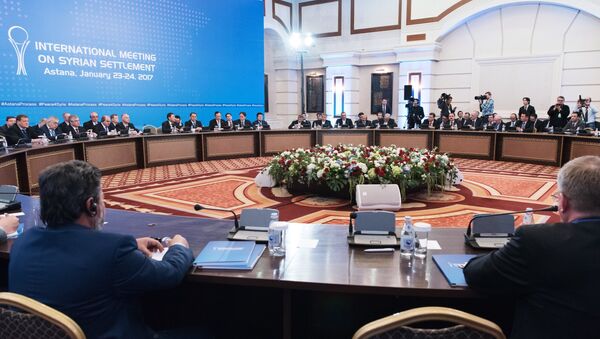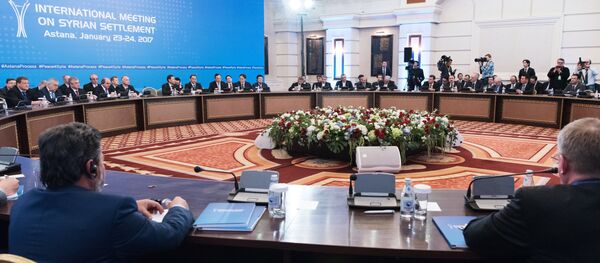MOSCOW (Sputnik) — According to a source in the Syrian opposition delegation, Russia proposed the creation of four such safe zones across Syria. However, the delegation of the armed Syrian opposition noted in its address to the ceasefire guarantor states that the possible creation of these zones might be a temporary measure and should not substitute the political process.
The issue of Syrian de-escalation zones was discussed between Russian President Vladimir Putin and his US counterpart Donald Trump during their phone conversation on Tuesday, and was mentioned the same day in Putin's talks with German Chancellor Angela Merkel.
Four Safe Zones
The Kazakh capital has already hosted three rounds of talks on Syria: January 23-24, February 15-16 and March 14-15. During these negotiations, the participants agreed to set up a ceasefire monitoring group on Syrian ceasefire among other issues.
Ahead of the ongoing round of intra-Syrian talks, a representative of the Syrian armed opposition told Sputnik that the Russian side had created a paper with a list of proposals about the observance of the ceasefire regime and establishment of zones of de-escalation of tensions.
According to the paper, which was given to opposition members and seen by Sputnik, Russia proposed the creation of four de-escalation zones: one in the Idlib province, a second in the north of the city of Homs, a third in eastern Ghouta, and a fourth in southern Syria. Russia also proposed the delineation of safety lines along the borders of the de-escalation zones in order to avoid direct fire between opposing sides of the Syrian conflict.
The document also presupposed the possible deployment of the guarantor states' armed groups to Syria for ceasefire monitoring and special working groups. However, it remains unclear which international forces will ensure the safety in these four zones.
Document Obligatory for All Parties
According to Kazakh Foreign Ministry's Asia and Africa Department Director General Aidarbek Tumatov, the issue of de-escalation zones is included on the agenda for the first day of the talks.
"A memorandum on the so-called de-escalation zones, zones of reducing tension is being worked out. The delegations are currently negotiating this topic," Tumatov told reporters.
When asked whether the Syrian opposition would agree to sign the paper, Tumatov said that the document would be obligatory for all the sides to the Syrian conflict.
"We are talking about the ceasefire guarantor states which will adopt the document… If the guarantor states agree on a document, it would be obligatory for all the sides," Tumatov said.
It is not yet clear which international organizations will facilitate the security in the four safe zones. According to a source in one of the delegations, the parties are considering various options, of which include the military forces of non-ceasefire guarantor states.
"We have not decided yet. We are considering all options. We want them to be moderate, independent," the source said, adding that Algeria, Egypt, the United Arab Emirates, as well as the BRICS [Brazil, Russia, India, China and South Africa] and the CSTO [the Collective Security Treaty Organization] countries are under consideration.
"But nobody trusts each other," the source added.
Ankara, however, hopes that the document on the establishment of four safe zones in Syria will be signed following the ongoing round of Astana talks, according to Turkish Foreign Minister Mevlut Cavusoglu.
"This is one of the problems that our groups discussed in Astana — the opposition and the government. There are four documents, on three of them we have reached a consensus… We are discussing this in Astana now, and I hope that we will find mutual understanding on this issue," Cavusoglu told Russian journalists when asked how proposals to create four safe zones in Syria are being discussed in Astana.
If adopted, the document will enter into force 24 hours after its signing, while the determination of the borders may take two weeks, according to a source in one of the delegations.
Opposition's Provocations
The fourth round of talks was accompanied by the opposition's demonstrative actions. A source in the Syrian armed opposition said that at midday, the delegation allegedly halted its participation in the talks and urged the ceasefire mediator states to stop hostilities.
The allegations were refuted later in the day by Tumatov, who said that the Syrian armed opposition did not freeze their participation, but rather ended their schedule for today.
"The opposition delegation simply left, because all of their meetings is over … Everything is in working over. I hope that the opposition will take part in all negotiations tomorrow too," Tumatov told reporters.
The armed Syrian opposition proceeded with an address to the parties in the talks, claiming that it regarded the possible creation of de-escalation zones in Syria a temporary move and not a substitute for the political process.
"Creating security zones is a temporary measure for de-escalation… and not an alternative for the political transition," the statement continues.
UN Special Envoy for Syria Staffan de Mistura noted a "serious development" in course of the talks on Syria in Astana after his meeting with the Syrian armed opposition and the US delegation.
"I am not going to give any comment now. But there is a serious development. I think we will talk [with journalists] tonight at 9 o'clock [15:00 GMT]," de Mistura told reporters, having concluded his bilateral meeting with the opposition delegation and his consultations with the US team.
The current round of negotiations will continue tomorrow.




